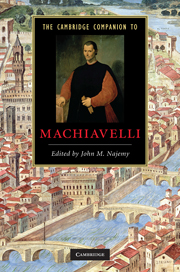Book contents
- Frontmatter
- Introduction
- 1 Niccolò Machiavelli: a portrait
- 2 Machiavelli in the chancery
- 3 Machiavelli, Piero Soderini, and the republic of 1494-1512
- 4 Machiavelli and the Medici
- 5 Machiavelli’s Prince in the epic tradition
- 6 Society, class, and state in Machiavelli’s Discourses on Livy
- 7 Machiavelli’s military project and the Art of War
- 8 Machiavelli’s Florentine Histories
- 9 Machiavelli and Rome: the republic as ideal and as history
- 10 Philosophy and religion in Machiavelli
- 11 Rhetoric and ethics in Machiavelli
- 12 Machiavelli and poetry
- 13 Comedian, tragedian: Machiavelli and traditions of Renaissance theater
- 14 Machiavelli and gender
- 15 Machiavelli’s afterlife and reputation to the eighteenth century
- 16 Machiavelli in political thought from the age of revolutions to the present
- Index
2 - Machiavelli in the chancery
Published online by Cambridge University Press: 28 September 2010
- Frontmatter
- Introduction
- 1 Niccolò Machiavelli: a portrait
- 2 Machiavelli in the chancery
- 3 Machiavelli, Piero Soderini, and the republic of 1494-1512
- 4 Machiavelli and the Medici
- 5 Machiavelli’s Prince in the epic tradition
- 6 Society, class, and state in Machiavelli’s Discourses on Livy
- 7 Machiavelli’s military project and the Art of War
- 8 Machiavelli’s Florentine Histories
- 9 Machiavelli and Rome: the republic as ideal and as history
- 10 Philosophy and religion in Machiavelli
- 11 Rhetoric and ethics in Machiavelli
- 12 Machiavelli and poetry
- 13 Comedian, tragedian: Machiavelli and traditions of Renaissance theater
- 14 Machiavelli and gender
- 15 Machiavelli’s afterlife and reputation to the eighteenth century
- 16 Machiavelli in political thought from the age of revolutions to the present
- Index
Summary
From June 19, 1498, to November 7, 1512, Niccolò Machiavelli served as a high-ranking official in the chancery of the Florentine republic. His election as second chancellor, aged twenty-nine, without previous notarial, secretarial, or administrative experience, was doubtless a political success. The faction supporting the firebrand preacher and fundamentalist religious reformer Girolamo Savonarola had reached the height of its power under Florence's new popular constitution at the end of 1497. Although by the beginning of 1498 its control was already teetering, it still managed to assert its influence in elections to the chancery in February, when Machiavelli lost, possibly because he was known to be critical of Savonarola in private, although he was not associated with any anti-Savonarolan faction. But the friar's party suffered a precipitate fall from power in April when its political leader, Francesco Valori, was murdered; at the end of May, Savonarola himself was tried and executed, and many of his supporters, including chancery staff, were removed from office. This gave Machiavelli his chance. Another circumstance favored Machiavelli after Savonarola's fall. Traditionally, the chancery was meant to be nonpolitical; unlike political magistrates who held power for short periods in order to limit, at least in theory, factional or personal influence over government, chancery officials served long periods, often for life.
- Type
- Chapter
- Information
- The Cambridge Companion to Machiavelli , pp. 31 - 47Publisher: Cambridge University PressPrint publication year: 2010
- 4
- Cited by

